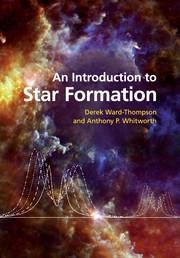Book contents
- Frontmatter
- Contents
- List of Illustrations
- Preface
- 1 Introduction
- 2 Probing star formation
- 3 The ISM – the beginnings of star formation
- 4 Molecular clouds – the sites of star formation
- 5 Fragmentation and collapse – the road to star formation
- 6 Young stars, protostars and accretion – building a typical star
- 7 The formation of high-mass stars, and their surroundings
- 8 By-products and consequences of star formation
- List of mathematical symbols
- List of figure credits
- Index
- References
1 - Introduction
Published online by Cambridge University Press: 05 June 2012
- Frontmatter
- Contents
- List of Illustrations
- Preface
- 1 Introduction
- 2 Probing star formation
- 3 The ISM – the beginnings of star formation
- 4 Molecular clouds – the sites of star formation
- 5 Fragmentation and collapse – the road to star formation
- 6 Young stars, protostars and accretion – building a typical star
- 7 The formation of high-mass stars, and their surroundings
- 8 By-products and consequences of star formation
- List of mathematical symbols
- List of figure credits
- Index
- References
Summary
About this book
It can be argued that astronomy is the oldest science. Since pre-historic times humans have gazed at the night sky and wondered about the nature and origin of stars. We now believe we understand a great deal about the nature of stars, but many aspects of the origin of stars remain the subject of intense study to this day.
In this book we aim to introduce the reader to the fundamentals of the subject of star formation. We describe the background physics underlying theories of star formation, and take the reader to the frontiers of current knowledge of this subject. However, we will make clear as we go along the points where we reach material that is less well established.
One of the most fundamental observations in astronomy is the fact that the night sky appears to be full of stars. Yet the processes which lead to the formation of those stars have taken astronomers many years to work out. Unlocking the mysteries of star formation has required the use of new techniques and the opening of new wavelength regimes to astronomy. We describe the chief physical processes which are believed to be important for star formation, and point out the role which each branch of observational astronomy has played in solving the various problems associated with star formation.
- Type
- Chapter
- Information
- An Introduction to Star Formation , pp. 1 - 20Publisher: Cambridge University PressPrint publication year: 2011



